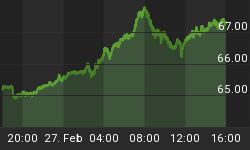During his testimony before Congress this week, Ben Bernanke didn't hesitate to opine on a number of topics that had very little to do with his mandate as Fed Chairman. The wealth gap, racial factors in income inequality, and the impact of capital gains tax policy were all fair game. But when queried about the one issue where his impact is unrivaled, the value of the U.S. dollar, the Chairman quickly passed the buck to the Secretary of the Treasury. Conveniently, the Secretary was nowhere in sight.
This should come as a surprise to no one, but the Fed sets monetary policy in the United States. The last time I checked, money in the United States is the dollar. Therefore monetary policy is in fact dollar policy. The supply of dollars is regulated by the Federal Reserve, with ostensibly no interference by the Federal government. The Fed also independently sets short-term interest rates, which are a huge factor in determining the dollar's value. In other words, the Fed controls both the supply of and yield on dollars. Bernanke claims to be worried about inflation, yet will say nothing about the value of the dollar. Prices rise as a result of the dollar losing value. How then can he ignore the persistent weakness in the dollar and refuse to comment on its effects on domestic inflation?
Why defer to the Secretary of the Treasury? Other than signing the bills, what does he have to do with monetary policy? As a member of the Cabinet, the Secretary's job is to advise the President on economic matters, manage the finances of the United States, help plan the budget and oversee appropriations. He has no control over either money supply or interest rates. That power was delegated to the Fed in 1913. Potentially, the Treasury Secretary could authorize using our meager foreign exchange reserves to buy dollars, but given our limited bank account of foreign currency, such intervention would be more embarrassing than effective. There is literally nothing the Secretary can do except repeat the useless mantra "A strong dollar is in our national interest."
Another interesting exchange occurred when a Congressman asked Bernanke what he would tell his Chinese counterpart in order to help convince the Chinese government that an appreciated yuan was in China's interest. First, Bernanke noted that a free-floating yuan would enable China to pursue an independent monetary policy. Unburdened by the need to print yuan to buy U.S. dollars, China could end the domestic inflation which is now causing Chinese consumer prices to rise and which has caused the formation of asset bubbles. The Chairman neglected to mention that if this were to occur, China's retreat from the U.S. Treasury bond market would send interest rates in this country significantly higher.
Second, Bernanke correctly stated that a higher yuan would create additional purchasing power in China, resulting in a higher percentage of China's resources being devoted toward satisfying domestic rather than foreign demand. The Chairman neglected to mention however, that such a re-allocation would result in fewer exports to the United States and higher prices for American consumers.
So if China actually adopted Bernanke's suggestions, the result in America would be that both consumer prices and interest rates would rise. For someone who claims to be worried that inflation will fail to moderate or that the subprime problems might spread to the overall housing market and the economy, it seems odd that Bernanke would encourage China to take steps that significantly raise the likelihood that both scenarios occur simultaneously.
Finally, Bernanke dismissed concerns about the wisdom of favoring core inflation over headline by asserting that oil prices will soon moderate. Considering that oil prices rose another 2% during his two-day testimony, and that he and his predecessor have consistently underestimated oil prices for years, what now makes his crystal ball any clearer? Also during his two-day testimony the dollar fell to new lows against most currencies and gold prices rose $15 dollar per ounce. Bernanke may claim that inflation is under control, but $76 dollar oil and $670 gold suggest otherwise.
For a more in depth analysis of the tenuous position of the Americana economy and U.S. dollar denominated investments, read my new book "Crash Proof: How to Profit from the Coming Economic Collapse." Click here to order a copy today.
More importantly, don't wait for reality to set in. Protect your wealth and preserve your purchasing power before it's too late. Discover the best way to buy gold at www.goldyoucanfold.com, download my free research report on the powerful case for investing in foreign equities available at www.researchreportone.com, and subscribe to my free, on-line investment newsletter at http://www.europac.net/newsletter/newsletter.asp.















